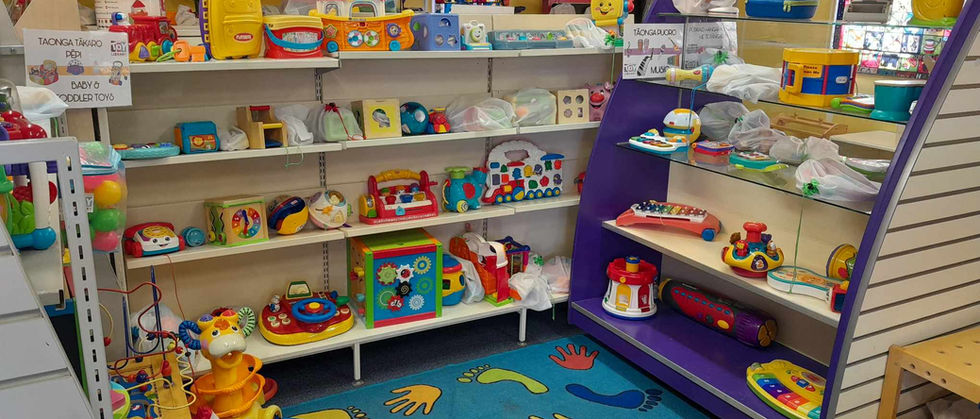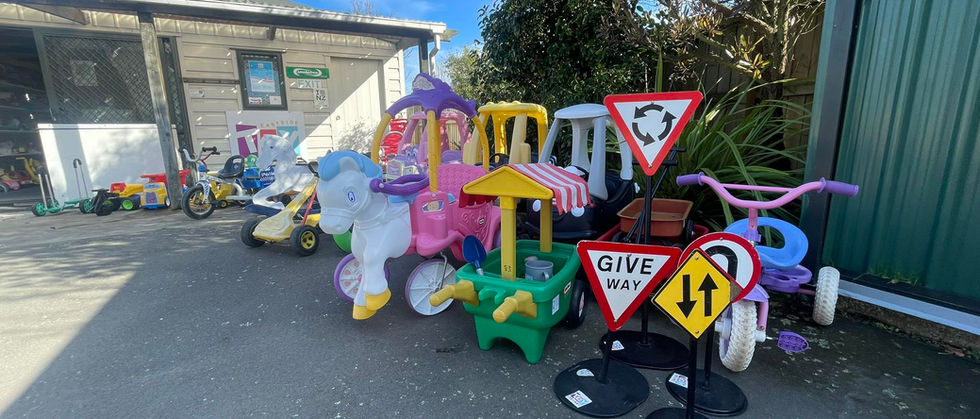Learning Through Play
Learning through play is fast becoming the gold standard of education in classrooms around the world, where children are able to explore, experiment, discover and solve problems through play. In New Zealand, learning through play forms the foundation of Te Whāriki, our early childhood curriculum, and is also becoming a more common approach to learning in our Junior Primary School classrooms too. Our role in the community is to provide our members with the toys and tools to support their child(ren)’s learning as a whānau.
Children begin to explore their world through play from birth. Peekaboo, one of the simplest games, hones motor skills and visual tracking - and even helps babies to understand that you still exist even if they can’t see you! And it's even fun too!
Learning through play is how we are built to learn, and helps children to master all the skills needed to survive this ever-changing world we live in!
Our Toys
Play is something that every child is able to do - it encourages curiosity, creativity and a love of learning! So check out a few of the toys that we have here at Eastside Toy Library to see how we can help your whānau learn through play!

Arts & Visual Learning -
Toi me te akoranga atāta
Creativity is how we tell the world who we are: we write, tell, perform, compose, and craft stories to share ourselves with the world. But it’s also how we draw connections, make sense of abstract ideas, and test things out. Getting creative can be as simple as imagining a broom as a horse, or as complex as designing and decorating a parachute that lets you drop an egg from the roof without breaking it. Creative play puts children in charge of exploring ideas, relationships, spaces and problems. It sparks confidence, as they learn to trust their natural curiosity. Creativity is also one of the most highly prized skills at work – one that business leaders keep saying is only getting more important. On top of the mental skills gained from creativity, craft also builds a child’s fine motor skills.
Baby & Toddler Toys -
Taonga tākaro pēpi
Children start learning from birth - through exploration and play, social interactions with other people, and watching and listening the world around them.


Construction & Building -
Waihanga
Balancing and building with blocks is a physical game that builds fine motor skills. Children can also use their imagination to create their own designs and worlds, letting them explore ideas and find solutions to problems as they create and construct.

Costumes -
Kākahu

Imaginative & Small World Play -
Takaro Pohewa
When children begin to use their imagination with play, it starts to build on their ability to recognise emotions, such as happiness and frustration, in themselves and in others. They work on their memory skills through creating their own dramas and stories, and they practise dealing with the unpredictable and facing frustration when things don’t go to plan in their playing. This is exactly the practice that will keep them level-headed in a crisis in future life, or to experiment with designing the next amazing innovation.

Role Play -
Toi Whakāri
Music -
Tāonga Puoro
Children are born into a world of sound and movement. Music helps their intellectual, imaginative, emotional, social and cultural growth. Music is enjoyable, soothing and assists in the development of listening skills, concentration, coordination, cooperation, communication and memory, as well as being a valuable resource for creativity. Children discover and develop different ways to be creative and expressive through making music, singing songs − including songs of their own − and keeping a steady beat through speech, chants, dances and movement to rhythm. They discover that music, dance and drama can amuse, delight, comfort, illuminate, inform and excite.


Running, jumping, sports and active games help children to grow both physically and mentally strong. Physical play also releases endorphins that boost your mood, no matter how old you are!
Outdoor Toys -
Hākinakina

Ride On Toys -
Waka

Sand & Water Play -
Onepū me wai

Puzzles & Games -
Pangahono me kēmu
Our games and puzzles provide children with the opportunity to work together as a team, learning how to solve problems, listen to others, negotiate, and to take turns. Playing together is also an essential skill for grown-up life, being able to collaborate will help children to do better at school, and later in life at work too. Building those necessary social skills from a young age will also improve your child(ren)’s mental health and wellbeing, helping them to grow into valuable members of our community. The joy of play gives them the incentive to develop complex reasoning skills, memory, and concentration – much more effectively than being told to sit still and reel off facts. Of course, since we don’t know what the future holds, all that flexible thinking will help them adapt to whatever new careers and life challenges the grown-up world has to offer them.
STEM -
Pūtaiao, hangarau, pūkaha me te pangarau
Exposing children to STEM (Science, Technology, Engineering & Mathematics) at a young age supports their overall academic growth and develops early thinking and reasoning skills. The real-life skills that children develop when learning STEM help make them better problem solvers and learners. So it’s never too soon to foster the incredible curiosity and inquisitiveness that are innate to children. STEM learning can happen anytime, anywhere - children’s play and exploration naturally leads to them being exposed to STEM concepts. In fact, children are natural born scientists! Science activities include exploring water and sand, comparing and contrasting natural materials, rolling balls and cards down ramps, and observing insects through a magnifying glass. Technology activities can include computers, but they also include working with tools such as scissors and with gears, wheels, and pulleys. Engineering happens when children plan and design structures with blocks and other building materials. Maths activities include counting and matching shapes and making patterns. Children have natural tendencies to explore, create, and innovate. We can help children continue to develop those tendencies by providing them with rich opportunities for exploration and discovery. Innovation is the key to their future, and to ours, and a strong foundation in STEM will help ensure that the future will indeed be bright.


Trucks, Trains & Vehicles -
Taraka tereina me ngā waka
Vehicles and transport are often the centre of great interest for children. They are naturally inquisitive, wanting to know how things work, why things happen and what things do. Many young children are fascinated by vehicles and forms of transport, such as trucks, diggers, cars, trains, buses or aeroplanes. Playing with these different types of vehicles gives children the opportunity to take what they see in the real world and mimic those activities in play.

















